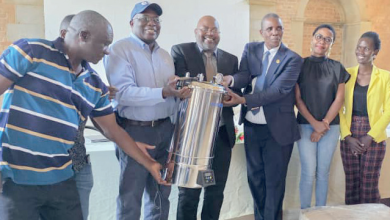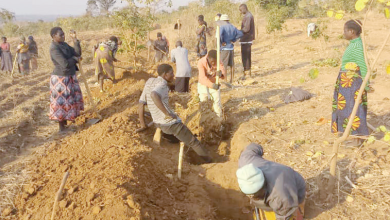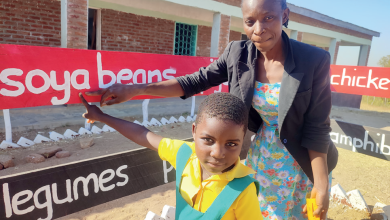Fertiliser price spike leave political pledges in the dust
Political manifestos brim with pledges to make fertiliser cheap and accessible, yet on the ground smallholder farmers are confronted with bags priced between K145 000 and K155 000.
Those costs far exceed what many can shoulder, casting doubt on whether any party’s promises will translate into real relief.
In the previous farming season, fertiliser prices ranged between K90 000 and K120 000 in agro-dealer shops.

In Chileka, north of Blantyre’s CBD, Hastings Sokosa shakes his head at current rates. Last season, he borrowed to buy fertiliser and spent half his maize harvest repaying the loan.
Now, with no clear guarantee that prices of the commodity will come down as pledged by parties, he fears he won’t afford a single bag next season.
“Fertiliser prices will likely shoot up in the next farming season and I don’t think I will afford even a single bag,” he said.
Sokosa said the fertiliser prices are a hindrance to farming for smallholder farmers, especially those who miss out on the Affordable Inputs Programme (AIP) and other social protection programmes.
Since its launch in 2020, AIP’s reach has shrunk dramatically. After helping 3.7 million households in its first year, beneficiaries fell to 2.7 million, then 2.5 million, and now just 1.5 million.
Meanwhile, the Ministry of Agriculture has remained silent on allocations for the year ahead, leaving farmers like Sokosa in limbo.
Enifa Mkwezalamba of Bvumbwe in Thyolo and Landilani Nyadani from Ntcheu share Sokosa’s despair.
Both plan to rent out their gardens rather than risk buying fertiliser at unaffordable rates or seek costly organic substitutes.
“Why maintain my fields when I can’t pay for inputs?” Mkwezalamba asks.
“I will rent out my garden in the farming season because I cannot simply afford the fertiliser. These prices will escalate.”
She said this is what she has agreed with five of her colleagues.
Said Mkwezalamba: “Last year we struggled to purchase fertilisers. We were left out of AIP and I doubt we will be considered this time. We are hopeless, so why maintain our gardens when we will struggle to purchase fertilisers?”
On her part, Nyadani feared the prices will disadvantage her.
“Even if I find alternatives to the fertilisers, surely it will cost money. So, where will I get the money from?” she said.
Meanwhile, party manifestos paint a different picture ahead of the September 16 2025.
The Malawi Congress Party (MCP) promises to keep improving AIP under its Make Malawi Feed Malawi platform. On its part, the Democratic Progressive Party (DPP) vows to revive the Farm Inputs Subsidy Programme (Fisp) and build a local fertiliser plant. The People’s Party (PP) pledges a Farm Input Loan Programme and the United Democratic Front (UDF) pledges transparent tenders for the vulnerable.
Reads MCP’s manifesto: “In addition to ensuring the right kind of fertiliser is available for various agroecological zones across the country, the MCP government is committed to making farm inputs, especially fertiliser, affordable and accessible to all through open market and AIP, which will continuously be improved and reformed to increase its efficiency and effectiveness.”
On the hand, the DPP manifesto states that apart from ensuring affordable fertilisers, it will develop a fertiliser production plant.
“This [Fisp] will target poor smallholder maize farmers who have land, ability to farm and are in well organised and trained clubs,” it reads.
As part of its integrated rural transformation agenda, the PP manifesto promises to implement a Farm Input Loan Programme to provide fertilisers and seeds on loan.
On its part, the UDF promises to implement food and fertilier schemes through transparent public tenders to empower the most vulnerable for economic participation.
Civil Society Agriculture Network (CisaNet) board chairperson Driana Lwanda on Thursday described increasing fertiliser prices as unfortunate.
In a written response, she said the worries are compounded by lack of information pertaining to AIP being part of this year’s production season.
She said: “However, farmers are encouraged to use strategies that focus on efficiency, cost reduction and alternative practices such as soil health management that reduce the need for chemical fertilisers.
“They can use integrated pest management to minimise the use of chemical pesticides, bulk purchasing of inputs through cooperative or group buying, exploring organic or alternative inputs like compost or manure and ensuring practising sustainable practices.”
Agriculture economist and development expert Tamani Nkhono Mvula said: “When you talk about increased productivity in Malawi, somebody has to use fertiliser.
“Of course, there might be other alternatives such as manure, but effectiveness in terms of increasing productivity in the short-term is minimal. But also, to produce manure to cover an entire farm is far-fetched.”
He said manure is only effective for horticultural crops, often on a small piece of land.
Nkhono Mvula said government should find ways for farmers to access fertilisers through social protection support, including AIP.
Minister of Agriculture Sam Kawale was not available for comment.
Farming households that are not shortlisted for AIP are considered for other social protection programmes to allow them purchase the fertilisers as per the previous AIP’s implementation strategy.
These include the Social Cash Transfer Programme, Climate Smart Enhanced Public Works Programme, National Economic Empowerment Fund farm input loans, Agriculture Commercialisation 2 funding, Mega Farm Support Unit initiative, Youth Entrepreneurship for the Future and Agriculture Programme and the Sustainable Agriculture Production 2.





